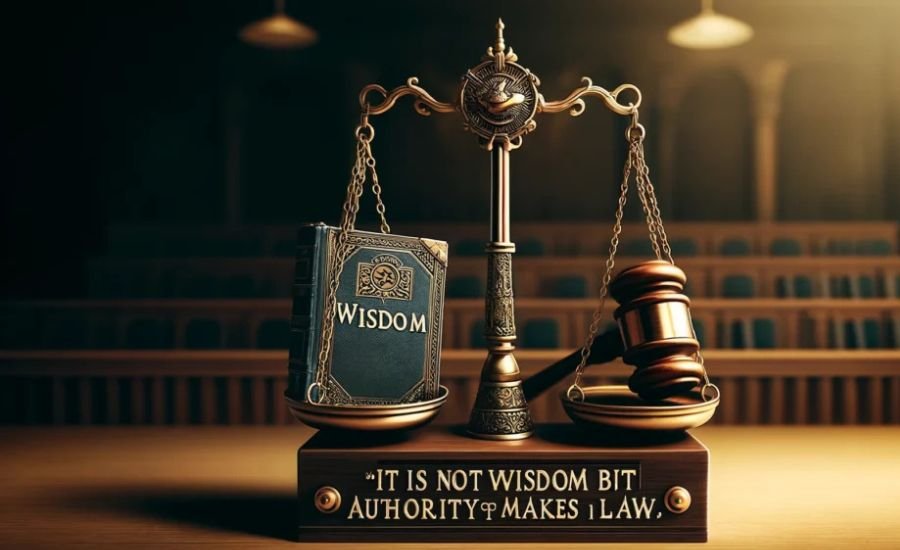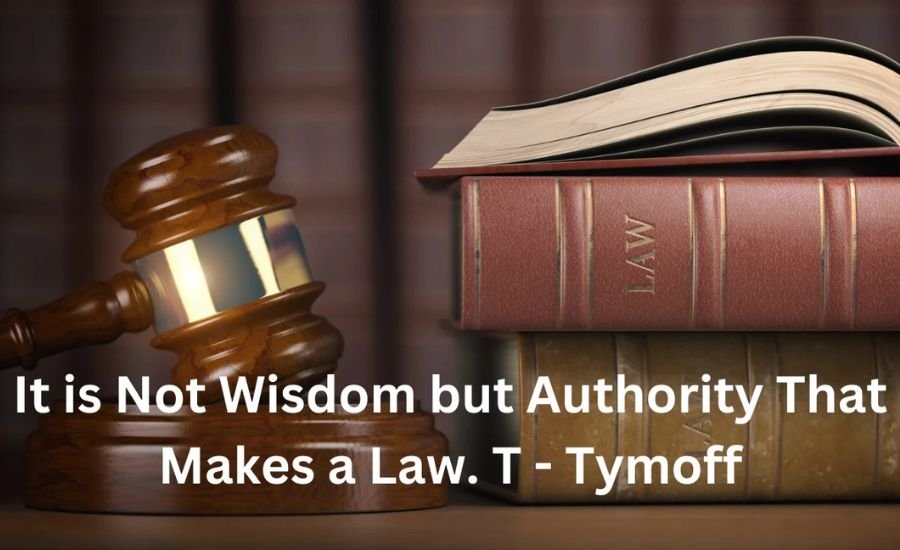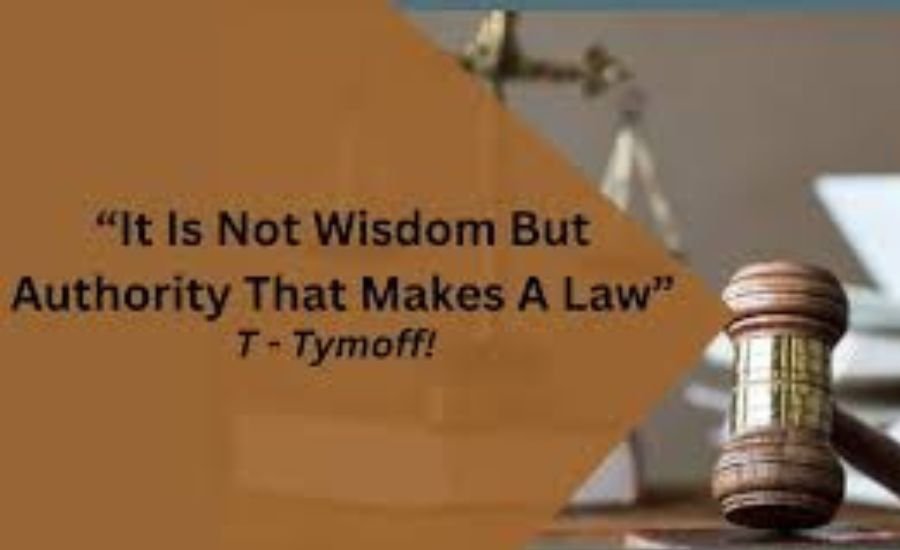It is not wisdom but authority that makes a law. T – Tymoff” is a powerful statement that speaks about how laws are created. When you think of laws, you might imagine them being based on what is wise or fair. But T. Tymoff says that laws are not always about wisdom. Instead, they are created by authority. This means that the people in charge, like governments and leaders, have the power to make laws, even if those laws don’t always seem to be the wisest. On my blog “World Wide,” we will explore this idea more.
So, why is authority the key to making a law? Well, it’s because the people with power are the ones who decide the rules everyone must follow. Even if the rules don’t always make sense to us, if the authority says it’s a law, it becomes something we have to obey. Let’s take a deeper look into this idea and what it means for us.
What Does “It Is Not Wisdom But Authority That Makes a Law” Mean?
“It is not wisdom but authority that makes a law. T – Tymoff” is an important statement that makes us think about how laws are created. According to T. Tymoff, laws aren’t always based on what’s smart or fair. Instead, they come from the people who have the power to create them, like governments or leaders. This means that laws can be made even if they don’t seem very wise.
When a leader or group in power makes a law, it’s because they have the authority. Authority means having the power to make decisions for everyone. So, a law doesn’t need to be wise; it just needs to be approved by the right people with authority. It helps us understand that laws aren’t always perfect, but they are still rules we have to follow.
Think about it like this: a teacher can set rules in the classroom because they have authority over the students. It might not always be the wisest rule, but the teacher has the power to make it a rule. In the same way, governments or leaders create laws with their authority, not necessarily wisdom.
How Authority Shapes the Laws We Follow

Authority plays a big role in how laws are made. The people in power, such as governments or rulers, are the ones who create the rules we must follow. This is why “it is not wisdom but authority that makes a law. T – Tymoff” is an important idea. Laws are not always about what is wise; they come from the decisions made by those in charge.
Sometimes, the laws that leaders create might not make much sense to everyone, but they still have the power to make them. Think of it like your parents at home. They set the rules, even if they’re not always the best rules. You still have to follow them because they have the authority in your house.
In society, the government is like the parent, and the people are like the children. The government sets rules or laws because they have the power to do so. Whether or not these laws are wise is another question, but authority decides what becomes a law, not wisdom alone. This helps us understand how authority shapes the rules we follow every day.
The Difference Between Wisdom and Authority in Lawmaking
Wisdom and authority are two very different things when it comes to making laws. “It is not wisdom but authority that makes a law. T – Tymoff” reminds us that laws don’t always come from what is the smartest or most reasonable idea. Instead, they come from people who hold power.
Authority means having the control or right to make decisions. In lawmaking, authority is what matters most. A leader or group of leaders uses their authority to create laws, whether or not those laws are the wisest. Wisdom, on the other hand, involves making decisions that seem smart or fair, but it is not always what guides the lawmaking process.
Think of it like this: a king can make rules for his kingdom because he has authority. His decisions might not always seem wise, but people have to follow them. In the same way, a government can make laws that may not always seem wise, but they still have the authority to do so.
T. Tymoff’s View on Authority and Laws
T. Tymoff believed that authority, not wisdom, is what makes a law. This idea helps explain why sometimes laws are created that don’t always make sense. “It is not wisdom but authority that makes a law. T – Tymoff” tells us that it is the people in charge who decide what the laws will be.
When we think about leaders making decisions, we realize that they don’t always need to be the wisest to make a law. They simply need to have the power to create rules that others must follow. This is why authority is so important in lawmaking. It is the power that allows leaders to set the rules, even if those rules are not always the most logical or wise.
This view is important because it reminds us that laws are not always perfect. Leaders with authority may create laws based on what is most convenient for them, not necessarily what is best for the people. Understanding this helps us better understand how laws are made and why they may not always seem wise.
Why Laws Aren’t Always Wise But Still Matter
Laws are meant to guide society, but they are not always based on wisdom. “It is not wisdom but authority that makes a law. T – Tymoff” shows us that the people with power are the ones who create laws, even if those laws don’t seem like the best ideas. Laws are often made because the people in power want to keep things under control.
Even though laws may not always be wise, they still matter because they help keep society organized. If everyone could make their own rules, it would be hard to get anything done. Leaders create laws to maintain order, but that doesn’t always mean the laws are based on what is smartest or fairest.
For example, there may be rules in your school that seem strange, but your teacher has the authority to make those rules. You might not agree with every rule, but you still have to follow them. In the same way, the laws created by those in charge may not always be the wisest, but they still help keep society running smoothly.
Understanding the Power of Authority in Lawmaking

Authority is the key to making laws. “It is not wisdom but authority that makes a law. T – Tymoff” explains that laws are created because people in power say so. These people, like government leaders or lawmakers, don’t have to be the wisest; they just need the authority to make rules.
The power of authority is what makes it possible for laws to exist. In every society, there are people who have the right to make decisions for everyone. This authority allows them to create laws, even if those laws are not always the best choices. Authority ensures that there is order, even when the laws are not always wise.
Without authority, there would be no rules to follow. Authority gives the power to create and enforce laws, which is why it is so important in lawmaking. When we understand the role of authority, we can better appreciate how laws are made, even if they are not always based on wisdom.
Can Laws Be Changed for the Better Using Wisdom?
While authority makes laws, wisdom can still play a role in improving them. “It is not wisdom but authority that makes a law. T – Tymoff” tells us that authority is the primary force behind lawmaking. But over time, society can use wisdom to change and improve laws that might not be working well.
Laws can be changed for the better if people with wisdom have a chance to share their ideas. While authority creates laws, wisdom helps guide those who have the power to change them. This balance is important in a healthy society where laws are made to serve everyone fairly.
For example, if a law seems unfair or outdated, wise leaders can use their authority to change it. Wisdom helps leaders see when it’s time to make new rules that are better for everyone. This shows how both authority and wisdom can work together to make laws that truly benefit society.
How Does Authority Create Laws Without Wisdom?
Authority has the power to create laws, but these laws aren’t always based on wisdom. “It is not wisdom but authority that makes a law. T – Tymoff” highlights how the people in charge can make decisions, even if those decisions aren’t the best. Sometimes, laws are made because it’s easier for leaders to control things.
Without wisdom guiding these decisions, laws can sometimes be unfair or not make sense. But authority still allows them to become laws that everyone must follow. The challenge is that authority can make laws without needing to be wise, which is why we sometimes see laws that don’t seem to help people.
For example, a law might be made to control something, but it might not be the smartest decision for the people it affects. Authority gives the power to make these laws, but it’s wisdom that can help make them better. This shows the importance of both authority and wisdom in lawmaking.
The Role of Leaders in Making Laws: Authority Over Wisdom

Leaders play a big role in making laws. “It is not wisdom but authority that makes a law. T – Tymoff” reminds us that it is the power of the leaders, not their wisdom, that makes laws happen. Leaders don’t always need to be wise, but they do need to have the authority to make rules for everyone.
When a leader makes a law, it is because they have the authority to do so. Their wisdom might not be the main reason for the law, but their power gives them the right to create rules. This is why authority is so important in lawmaking. Without authority, there would be no one to make the decisions.
Leaders with authority are the ones who decide what rules we follow. While their decisions might not always be the wisest, they still have the power to make them into laws. This shows how authority is what really drives lawmaking, not always wisdom.
Does Authority Mean the Laws Are Always Right?
Just because a law is created with authority doesn’t mean it’s always right. “It is not wisdom but authority that makes a law. T – Tymoff” teaches us that authority is what gives laws their power, not wisdom. Leaders can make laws, but that doesn’t mean those laws are always fair or smart.
Sometimes, laws are made because leaders want to control something, but these laws might not help everyone. The authority to make laws is important, but it doesn’t always mean the laws are the best choices. This is why it’s important to think about wisdom when looking at laws.
Even though authority makes laws, we must remember that not all laws are perfect. Leaders use their power to create rules, but those rules might not always be the right ones. Understanding this helps us see that laws are not always based on what is wise, but what the leaders decide.
Things You Have To: Interview-With-The-Vampire-Season-2
What Happens When Authority Makes Laws Without Wisdom?
When authority makes laws without wisdom, the results can be problematic. “It is not wisdom but authority that makes a law. T – Tymoff” tells us that laws are made because of authority, not necessarily wisdom. This can lead to laws that are unfair or don’t make sense.
Without wisdom guiding authority, laws can sometimes hurt people instead of helping them. Leaders may create laws that are too harsh or not thought through. But because they have the authority to do so, people are still required to follow these laws.
This is why it’s important to have leaders who use both authority and wisdom to create laws. Without wisdom, authority can lead to decisions that aren’t good for everyone. It shows us the need for balance in lawmaking.
Exploring T. Tymoff’s Thoughts on Law and Authority
T. Tymoff’s quote, “It is not wisdom but authority that makes a law,” gives us a lot to think about when it comes to lawmaking. Tymoff explains that authority is what drives laws, not wisdom. Leaders can create laws just because they have the power, even if those laws aren’t the wisest.
Understanding Tymoff’s view helps us see that laws are not always created with fairness in mind. Authority is what gives laws their power, but it doesn’t mean the laws are always right. By exploring Tymoff’s thoughts, we can better understand how laws are made and why they might not always be the smartest choices.
Tymoff’s ideas remind us that authority is what shapes the laws we follow. Even though wisdom can help guide these decisions, it is authority that gives them the power to become laws. This helps us understand the balance between authority and wisdom in lawmaking.
Conclusion
In conclusion, “it is not wisdom but authority that makes a law. T – Tymoff” helps us understand that laws are created by the people in power, not necessarily because they are the smartest ideas. Leaders or governments make rules because they have the authority to do so. While wisdom can help improve laws, authority is what gives them the power to become real rules we must follow.
Even though laws made by authority might not always be the wisest, they still play an important role in keeping society organized. By understanding that authority shapes the laws we follow, we can think about how to make laws better with wisdom in the future. It’s important to remember that laws are not always perfect, but they help create order in our world.
Read You Have To Know: The-New-Zealand-National-Cricket-Team-vs-India-National-Cricket-Team-Timeline-a-Look-Back-At-Key-Moments-2024
FAQs
Q: What does “it is not wisdom but authority that makes a law” mean?
A: This quote means that laws are created by those who have power, not necessarily because they are the best or wisest ideas. Authority, not wisdom, is what gives laws their strength.
Q: Who has the authority to make laws?
A: Laws are made by government leaders, lawmakers, or institutions that have the power to create rules. These can include presidents, congress members, or judges.
Q: Are all laws wise and fair?
A: No, not all laws are wise or fair. Sometimes, laws are created without considering what’s best for everyone, even though they still have to be followed.
Q: Can laws change over time?
A: Yes, laws can change over time. As society grows and changes, leaders may change laws to make them fairer or more in line with new values and ideas.
Q: How can authority affect the fairness of laws?
A: Authority can sometimes lead to unfair laws if the people in power don’t consider everyone’s needs or make decisions without wisdom. This can cause harm to certain groups or individuals.
Q: Is it important to have both wisdom and authority in lawmaking?
A: Yes, it’s very important. While authority is needed to make laws, wisdom helps ensure that the laws are just and beneficial to society.
Q: How do we make sure laws are based on wisdom?
A: To make sure laws are wise, we need leaders who listen to the people, gather good ideas, and think carefully before making decisions. This can lead to better laws that help everyone.
